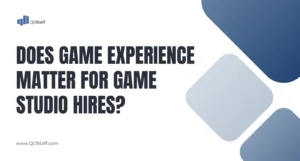A study of 20,000 hires concluded that 89% of hiring failures were related to culture and only 11% related to technical skills. Successful team building is about finding people who mesh with your team’s unique culture. Cultural fit in game studios plays a critical role, as game development thrives on creativity, teamwork, and trust. If someone doesn’t fit within that framework, the individual and the team will struggle. That’s why cultural fit is key when building a successful team in a game studio.
What Does Cultural Fit Really Mean?
At its core, cultural fit means hiring people whose values, work style, and attitude align with the existing team. It’s more than just sharing a passion for games—it’s about how well someone works with others, whether they communicate clearly, and how they handle feedback.
In a game studio, where collaboration is a daily necessity, having team members who understand and respect each other’s processes and can work together smoothly makes all the difference. Cultural alignment helps ensure each person adds to the team’s strengths rather than creating friction. It becomes the foundation for team collaboration in game development, which is essential for successful projects.
Why It’s Crucial for Collaboration
Game development is all about teamwork. Designers, animators, programmers, and writers—everyone must work together to bring a game to life. If there’s a misalignment in how the team operates or communicates, it can slow things down and create unnecessary conflict.
Hiring for cultural fit in game studios means you’re more likely to build a team that communicates effectively, shares ideas openly, and problem-solves together. In game development, where deadlines are often tight and projects can be complex, team collaboration is essential. A team that works well together can handle challenges better and produce higher-quality games, increasing employee retention in game studios because people feel more connected and valued within a cohesive group.
Boosting Employee Retention
When employees feel like they belong and align with a company’s values, they’re more likely to stay longer and remain motivated. This connection to the studio’s culture makes employees feel more engaged and invested in the success of their projects. As a result, employee retention improves, and you’re not constantly losing talent due to mismatches in culture.
On the flip side, when cultural fit isn’t considered, you might find talented developers leaving because they don’t feel connected to the studio’s goals or work culture. High turnover can hurt game studio productivity, and morale, leading to a less effective team overall.
Encouraging Innovation
A strong cultural fit doesn’t just make teams work well together—it can drive innovation in gaming. When employees feel comfortable and respected, they’re more likely to take creative risks, share new ideas, and push boundaries. In game development, where fresh ideas are always needed, fostering a culture that encourages team collaboration can lead to more unique and innovative games.
Teams that have solid cultural alignment are better equipped to tackle problems creatively and come up with solutions that a more fragmented team might not reach. In such a competitive industry, innovation is often the key to standing out in the gaming market.
Building a Future-Ready Team
Hiring for cultural fit ensures that your game studio is prepared for future growth. When your team shares the same values and vision, they’re more likely to stick together through challenges, adapt to changes in technology, and continue producing great games. It’s not just about filling positions; it’s about building a positive work culture in game studios and creating a team that’s aligned in their passion and can grow alongside the studio.
By focusing on cultural alignment, you’re setting your game studio up for long-term success. The right people, working together in harmony, can achieve incredible things and help your studio stay innovative and productive.
Conclusion
In the fast-paced world of game development, where collaboration and creativity are essential, cultural fit in game studios is just as important as technical skills. When hiring, finding people who align with your studio’s values, communication style, and teamwork approach can make all the difference. It’s not just about getting the best coder or designer—it’s about building a cohesive, creative, and motivated team that will take your games to the next level.
—–
About QDStaff
Follow us for top-notch advice, exclusive roles, and the best game industry opportunities. Stay connected and let great opportunities flow straight to your feed. Don’t miss out on your next big adventure in gaming!
More at www.QDStaff.com
Follow QDStaff on LinkedIn for more insights on building award-winning game studios.




